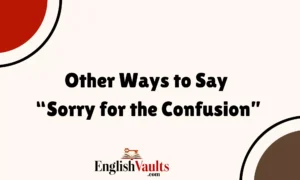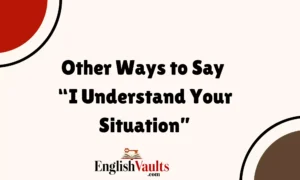When navigating conversations, especially in professional settings, clarity is key. Sometimes, we find ourselves wanting to express our thoughts without being misunderstood. The phrase “don’t get me wrong” often serves as a disclaimer for our statements, indicating that what follows is not meant to offend or mislead. However, relying solely on this phrase can limit the richness of our communication.
In this article, we will explore 26 alternative expressions to convey the same sentiment while ensuring that our intentions are clear. Each alternative will be accompanied by practical examples, such as complete emails, to demonstrate how to implement these phrases in real-life scenarios.
List of Other Ways to Say “Don’t Get Me Wrong”
- I Don’t Mean to Offend
- I Hope This Doesn’t Come Across the Wrong Way
- Please Understand My Perspective
- I Want to Make My Intentions Clear
- Let Me Explain My Point of View
- I Don’t Want to Sound Dismissive
- I’m Not Trying to Criticize
- I Don’t Want to Mislead You
- What I’m Really Saying Is
- I Hope You Can See My Side
- I Don’t Want to Be Misunderstood
- Let Me Clarify My Thoughts
- I Respect Your Opinion, But…
- I’m Not Trying to Undermine You
- I Want to Add Some Context
- Let Me Rephrase That
- I Want to Share My Perspective
- I Don’t Want to Confuse You
- I Want to Be Clear About My Intentions
- I Don’t Want to Detract from Your Ideas
- I’m Open to Different Perspectives
- I Don’t Want to Seem Insensitive
- I Just Want to Clarify
- I Don’t Want to Downplay Anything
- Let’s Make Sure We Understand Each Other
1. I Don’t Mean to Offend
When expressing a potentially sensitive opinion, it’s important to clarify your intentions upfront.
Example Email:
Subject: Feedback on the Project
Hi Leo,
I wanted to share my thoughts on the project we just completed. I don’t mean to offend, but I believe we could improve the presentation to make it more engaging. Perhaps we could incorporate more visuals to illustrate our key points.
Let me know what you think!
Best, Henry
Additional Insight:
This phrase is particularly useful in environments where sensitivity to feedback is crucial, such as in creative discussions. By using this disclaimer, you set a respectful tone while still providing constructive criticism.
2. I Hope This Doesn’t Come Across the Wrong Way
This expression emphasizes your desire for your words to be received positively.
Example Email:
Subject: Thoughts on the Marketing Strategy
Hi Leo,
I’ve been reviewing our marketing strategy, and I have some suggestions. I hope this doesn’t come across the wrong way, but I feel that focusing more on social media outreach could attract a younger audience.
Looking forward to discussing this further!
Best, Henry
Additional Insight:
Using this phrase allows you to express a potentially controversial opinion while also inviting dialogue. It suggests that you value the other person’s perspective.
3. Please Don’t Misinterpret Me
A clear way to indicate that you want to avoid misunderstandings.
Example Email:
Subject: Clarification on My Previous Email
Hi Leo,
I wanted to clarify my previous email regarding the budget cuts. Please don’t misinterpret me; my intention was to highlight areas where we can save costs, not to diminish the importance of any department’s contributions.
I appreciate your understanding!
Best, Henry
Additional Insight:
This phrase is beneficial in discussions where there may be ambiguity. It helps you take responsibility for ensuring clarity.
4. I Just Want to Clarify
Use this phrase when you want to prevent confusion about your previous statements.
Example Email:
Subject: Project Direction
Hi Leo,
After our last meeting, I had some thoughts. I just want to clarify that my concerns about the timeline are not meant to undermine the team’s efforts. I fully trust our capabilities; I just want to ensure we meet our goals without unnecessary pressure.
Thanks for considering my viewpoint!
Best, Henry
Additional Insight:
This expression demonstrates a proactive approach to communication, showing that you value clear dialogue.
5. I’m Not Trying to Be Critical
This phrase helps to soften feedback by highlighting that your intention is not to criticize.
Example Email:
Subject: Team Performance Review
Hi Leo,
I wanted to touch base about our recent performance metrics. I’m not trying to be critical, but I believe we should analyze our strategies to see what can be improved for next quarter.
I’d love to hear your thoughts.
Best, Henry
Additional Insight:
This approach allows for an open discussion about performance while ensuring that the conversation remains constructive.
6. What I Mean is…
This phrase allows for clarification of your previous statements and can guide the conversation in a more precise direction.
Example Email:
Subject: Feedback on Your Proposal
Hi Leo,
I appreciate the effort you put into your proposal. What I mean is, while your ideas are strong, I believe we could benefit from more detailed research to support our claims.
Let’s discuss this further!
Best, Henry
Additional Insight:
This phrasing can enhance understanding by providing a bridge to your core message, ensuring that the recipient knows exactly where you stand.
7. To Be Clear
This is a straightforward phrase that signals you are about to emphasize a critical point.
Example Email:
Subject: Upcoming Changes
Hi Leo,
With the upcoming changes, I wanted to reach out. To be clear, my goal is to ensure we are all on the same page about the project deadlines and responsibilities.
Please let me know if you have any questions.
Best, Henry
Additional Insight:
Using this phrase helps reinforce your message, making it more memorable for the recipient.
8. I Don’t Want to Give the Wrong Impression
This phrase allows you to express concern over how your message may be perceived.
Example Email:
Subject: Our Last Meeting
Hi Leo,
I’ve been reflecting on our last meeting, and I don’t want to give the wrong impression. I value everyone’s input and believe that collaboration is key to our success. My previous comments were aimed at improving our process, not undermining anyone’s contributions.
Thanks for understanding!
Best, Henry
Additional Insight:
This phrase fosters an inclusive atmosphere by showing your appreciation for team dynamics while also reinforcing your stance.
9. Just to Be Clear
This is similar to “to be clear,” but adds a conversational touch.
Example Email:
Subject: Follow-Up on Action Items
Hi Leo,
I wanted to follow up on our action items. Just to be clear, I think we should prioritize the client feedback before moving forward with the next steps.
Let’s touch base soon!
Best, Henry
Additional Insight:
This expression keeps the conversation concise while ensuring clarity in your instructions.
10. I’m Only Suggesting
This phrase indicates that your thoughts are meant to be helpful, not critical.
Example Email:
Subject: Enhancing Our Team Meetings
Hi Leo,
I’ve noticed that our team meetings sometimes go off track. I’m only suggesting that we set a strict agenda to help us stay focused.
What do you think?
Best, Henry
Additional Insight:
This phrase invites collaboration and indicates your openness to feedback, reinforcing a positive communication style.
11. I Don’t Want to Sound Dismissive
Use this when you wish to affirm the value of other perspectives while expressing your opinion.
Example Email:
Subject: Project Feedback
Hi Leo,
After reviewing the latest project updates, I don’t want to sound dismissive, but I think we need to revisit our approach. There may be some aspects we overlooked that could enhance our results.
Let’s discuss this further!
Best, Henry
Additional Insight:
This phrase acknowledges the contributions of others while still allowing you to present your thoughts constructively.
12. My Intent is Not to Offend
This expression emphasizes that you value the feelings of others while sharing your viewpoint.
Example Email:
Subject: Policy Changes
Hi Leo,
Regarding the recent policy changes, my intent is not to offend anyone, but I feel that there are some areas that may need further discussion before implementation.
Looking forward to hearing your thoughts!
Best, Henry
Additional Insight:
This phrase can be particularly effective in discussions that may touch on sensitive subjects, helping to ease tension.
13. Let Me Explain
This phrase sets the stage for clarifying your thoughts.
Example Email:
Subject: Clarification on My Thoughts
Hi Leo,
I realized my previous message might not have been clear. Let me explain my perspective: I believe that enhancing our digital marketing strategy can significantly increase our reach and engagement.
Thanks for your patience!
Best, Henry
Additional Insight:
This expression invites dialogue and encourages the other person to engage with your reasoning.
14. I Want to Make Sure We’re on the Same Page
This phrase shows a commitment to mutual understanding and can help bridge any gaps.
Example Email:
Subject: Aligning Our Goals
Hi Leo,
As we approach the new quarter, I want to make sure we’re on the same page regarding our objectives and expectations. Open communication is crucial for our success.
Let’s schedule a time to chat!
Best, Henry
Additional Insight:
This phrase emphasizes teamwork and cooperation, fostering a collaborative atmosphere.
15. I Hope You Understand Where I’m Coming From
This phrase expresses empathy and encourages the recipient to consider your perspective.
Example Email:
Subject: Feedback on Your Ideas
Hi Leo,
I truly appreciate the ideas you shared during our last meeting. I hope you understand where I’m coming from when I say that we might need to refine some of those concepts to align better with our audience.
Let’s work on this together!
Best, Henry
Additional Insight:
This expression shows that you value the other person’s input while gently steering the conversation in your preferred direction.
16. I’m Not Trying to Dismiss Your Concerns
This phrase can diffuse any tension that may arise from a disagreement.
Example Email:
Subject: Addressing Concerns
Hi Leo,
I’ve read through the concerns raised during our discussion. I’m not trying to dismiss your concerns, but I believe we have a solid foundation to build upon. Let’s explore how we can address those issues while staying on track.
Looking forward to your input!
Best, Henry
Additional Insight:
This phrase shows respect for the recipient’s feelings while still standing by your viewpoint, fostering an open dialogue.
17. I Want to Share My Perspective
Use this phrase to introduce your thoughts as a contribution to the conversation.
Example Email:
Subject: Upcoming Project Strategy
Hi Leo,
As we finalize our project strategy, I want to share my perspective on our target demographics. I believe there’s an opportunity to expand our reach by including younger audiences in our marketing efforts.
Let me know your thoughts!
Best, Henry
Additional Insight:
This expression encourages others to consider your viewpoint while framing it as a personal contribution rather than an absolute truth.
18. I Don’t Want to Confuse You
This phrase emphasizes your intention to clarify rather than complicate the conversation.
Example Email:
Subject: Clarifying My Previous Email
Hi Leo,
I realize my last email may have been a bit convoluted. I don’t want to confuse you; my main point is that I believe we should reconsider the timeline for the project to ensure quality outcomes.
Thanks for your patience!
Best, Henry
Additional Insight:
This phrase can help ease misunderstandings and promote a clearer exchange of ideas.
19. Let Me Clarify My Intentions
This phrase invites the recipient to engage with your message openly.
Example Email:
Subject: Feedback on the Presentation
Hi Leo,
Thank you for your hard work on the presentation. Let me clarify my intentions; my previous suggestions were aimed at enhancing clarity and engagement, not undermining your efforts.
I appreciate your dedication!
Best, Henry
Additional Insight:
This expression is especially useful in collaborative environments, ensuring that everyone is aligned in their goals.
20. I Want to Make My Position Clear
Use this phrase when you wish to assert your viewpoint without causing friction.
Example Email:
Subject: Project Direction
Hi Leo,
I’ve been thinking about our project direction, and I want to make my position clear: I believe that a focus on sustainability could greatly enhance our brand image and appeal.
I’d love to discuss this further!
Best, Henry
Additional Insight:
This phrase strengthens your message by reinforcing your commitment to your viewpoint while remaining open to discussion.
21. I Don’t Want to Detract from Your Ideas
This phrase demonstrates respect for the other person’s contributions while sharing your thoughts.
Example Email:
Subject: Collaborating on Ideas
Hi Leo,
I’ve been considering our brainstorming session. I don’t want to detract from your ideas, but I think we could incorporate some market research to back our suggestions.
Let’s collaborate to refine our approach!
Best, Henry
Additional Insight:
This approach acknowledges the value of the other person’s input, fostering a supportive environment for sharing ideas.
22. I’m Open to Different Perspectives
This phrase invites dialogue and expresses your willingness to listen.
Example Email:
Subject: Exploring New Approaches
Hi Leo,
Regarding our current project, I’m open to different perspectives. If you have ideas on how we can improve our strategy, I would love to hear them.
Let’s brainstorm together!
Best, Henry
Additional Insight:
This phrase encourages collaboration and demonstrates a commitment to inclusivity in decision-making.
23. I Don’t Want to Seem Insensitive
Use this phrase to express your awareness of the sensitivity of a situation.
Example Email:
Subject: Addressing Recent Feedback
Hi Leo,
After receiving the feedback about our recent campaign, I don’t want to seem insensitive to the concerns raised. I truly believe we can make adjustments that respect everyone’s input while still achieving our goals.
I appreciate your thoughts on this matter!
Best, Henry
Additional Insight:
This phrase can be particularly effective in delicate discussions, ensuring that you approach the topic with care and consideration.
24. What I’m Trying to Say is…
This is a casual way to segue into your main point while ensuring clarity.
Example Email:
Subject: Revisiting Our Goals
Hi Leo,
As we move forward, what I’m trying to say is that we need to revisit our goals to ensure they align with our overall vision. This will help us stay focused and motivated.
Looking forward to your input!
Best, Henry
Additional Insight:
This phrase is informal and can help make the conversation feel more friendly and approachable.
25. I Don’t Want to Downplay Anything
This phrase indicates that you value the contributions of others while sharing your opinion.
Example Email:
Subject: Team Contributions
Hi Leo,
I want to take a moment to recognize everyone’s hard work. I don’t want to downplay anything, but I feel we need to address some gaps in our strategy to maintain momentum.
Let’s discuss how we can enhance our efforts!
Best, Henry
Additional Insight:
This expression fosters an environment of appreciation while still encouraging improvement, maintaining a positive tone.
26. Let’s Make Sure We Understand Each Other
This phrase emphasizes the importance of mutual understanding in communication.
Example Email:
Subject: Aligning Our Efforts
Hi Leo,
As we finalize our project plans, let’s make sure we understand each other regarding our roles and responsibilities. Clear communication is essential for our success.
Please feel free to share any concerns!
Best, Henry
Additional Insight:
This phrase reinforces teamwork and collaborative efforts, ensuring everyone is on the same page moving forward.
Conclusion
In conclusion, the phrase “don’t get me wrong” serves as a useful tool in conversations, but it’s often more effective to use a variety of expressions to convey your thoughts clearly and respectfully. The alternatives provided in this article can help you navigate discussions with confidence, ensuring that your intentions are understood without risking misunderstandings. By adopting these phrases, you not only enhance your communication skills but also create a more inclusive environment for sharing ideas and feedback. Use these phrases wisely in your conversations, and you’ll likely find that they foster better understanding and collaboration in your interactions.










